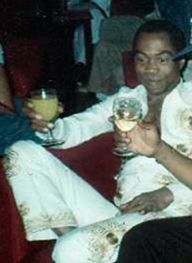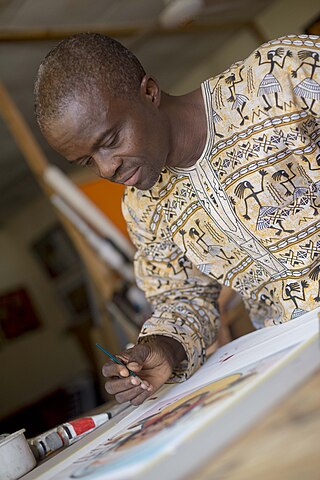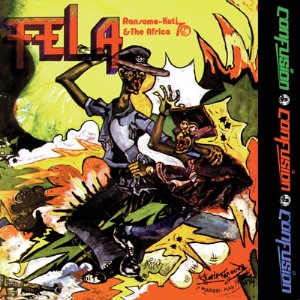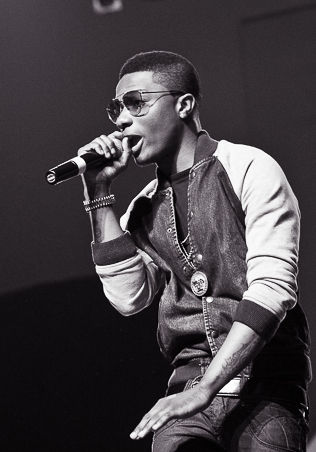
Afrobeat is a Nigerian music genre, fusing influences from Nigerian with American funk, jazz, and soul influences. With a focus on chanted vocals, complex intersecting rhythms, and percussion, the style was pioneered in the 1960s by Nigerian multi-instrumentalist and bandleader Fela Kuti, who popularised it both within and outside Nigeria. At the height of his popularity, he was referred to as one of Africa's most "challenging and charismatic music performers."

Fela Aníkúlápó Kútì was a Nigerian musician and political activist. He is regarded as the principal innovator of Afrobeat, a Nigerian music genre that combines West African music with American funk and jazz. At the height of his popularity, he was referred to as one of Africa's most "challenging and charismatic music performers". AllMusic described him as "a musical and sociopolitical voice" of international significance.

Lagos State is a state in southwestern Nigeria. Of the 36 Nigerian states, it is the second most populous state but the smallest in area. Bounded to the south by the Bight of Benin and to the west by the international border with Benin for 10 km, Lagos State borders Ogun State to the north for about 283 km, making it the only Nigerian state to border only one other state. Named for the city of Lagos—the most populous city in Africa—the state was formed from the Western Region and the former Federal Capital Territory on 27 May 1967.

Tony Oladipo Allen was a Nigerian and French drummer, composer, and songwriter who lived and worked in Paris, France. Allen was the drummer and musical director of Fela Kuti's band Africa '70 from 1968 to 1979, and was one of the founders of the Afrobeat genre. Fela once stated that "without Tony Allen, there would be no Afrobeat". He was described by Brian Eno as "perhaps the greatest drummer who has ever lived". Later in life, Allen collaborated with Damon Albarn on several projects, including Gorillaz, the Good, the Bad & the Queen and Rocket Juice & the Moon.
Organised crime in Nigeria includes activities by fraudsters, bandits, drug traffickers and racketeers, which have spread across Western Africa. Nigerian criminal gangs rose to prominence in the 1980s, owing much to the globalisation of the world's economies and the high level of lawlessness and corruption in the country.

Lemi Ghariokwu, also known simply as Lemi, is a Nigerian painter, illustrator and designer who is most renowned for providing many of the original cover images for the recordings of Nigerian musician Fela Kuti.

Surulere is a local government area located on the mainland in Lagos State, Nigeria. It has an area of 23 km2 (8.9 sq mi). At the 2006 census, there were 503,975 inhabitants, with a population density of 21,864 inhabitants per square kilometer. The local government area is bordered by Yaba, Mushin and Ebute-Metta.
Victor Abimbola Olaiya, , also known as Dr Victor Olaiya, was a Nigerian trumpeter who played in the highlife style. Though famous in Nigeria during the 1950s and early 1960s, Olaiya received little recognition outside his native country. Alhaji Alade Odunewu of the Daily Times called him "The Evil Genius of Highlife."

Confusion is a 1975 album by Nigerian Afrobeat musician Fela Kuti and his Africa 70 band. It was arranged, composed, and produced by Kuti, who recorded the album after choosing to emphasize his African heritage and nationalism in his music. Confusion is a commentary on the confused state of post-colonial Lagos and its lack of infrastructure and proper leadership at the time. Kuti's pidgin English lyrics depict difficult conditions in the city, including a frenetic, multilingual trading market and inextricable traffic jams in Lagos' major intersections.

Ayodeji Ibrahim Balogun, known professionally as Wizkid, is a Nigerian singer and songwriter. Born in the Ojuelegba suburb of Surulere, Lagos, Wizkid is a voice in the emerging Afrobeats movement. His music is a blend of Afrobeats, afropop, R&B, afrobeat, reggae, dancehall, and pop. He began recording music at the age of 11 and released a collaborative album with the Glorious Five, a group he and a couple of his church friends formed. In 2009, Wizkid signed a record deal with Banky W's Empire Mates Entertainment (E.M.E). He rose to the limelight after releasing "Holla at Your Boy", the lead single from his debut studio album, Superstar (2011), which also spawned the singles "Tease Me/Bad Guys" and "Don't Dull".

"Surulere" is a song by Nigerian singer Dr SID. It was released on November 13, 2013, as the lead single from his second studio album, Siduction (2013). Don Jazzy produced the song and was featured on it. "Surulere" peaked at number one on MTV Base's Official Naija Top 10 chart for the week of March 21 through March 27, 2014. It also peaked at number two on the Pulse Nigeria Music Video chart. "Surulere" won Best Collabo of the Year at the 2014 City People Entertainment Awards and was nominated for Song of the Year at both The Headies 2014 and MTV Africa Music Awards 2014.

L.I.F.E is the debut studio album by Nigerian singer Burna Boy. It was released on August 12, 2013, by Aristokrat Records. The album serves as the follow-up to his second mixtape, Burn Identity (2011), and sold 40,000 copies on the first day of its release. Aristokrat Records later sold the album's marketing rights to Uba Pacific for ₦10 million. L.I.F.E was supported by the singles "Like to Party", "Tonight", "Always Love You", "Run My Race" and "Yawa Dey". The album was produced entirely by Leriq and features guest appearances from 2face Idibia, M.I, Timaya, Olamide, Reminisce and Wizkid.

Raoul John Njeng-Njeng, better known by his stage name Skales, is a Nigerian rapper, singer and songwriter. He relocated to Lagos and signed a record deal with Empire Mates Entertainment (E.M.E) in 2009.

Legendury Beatz is a Nigerian record producing and songwriting duo, composed of siblings Uzezi Oniko and Okiemute Oniko. Their production style is deeply rooted in afrobeats as well as in several other genres, including hip hop, reggae fusion, moombahton and electro house.
"Ojuelegba" is a song by Nigerian singer Wizkid from his self-titled second studio album, Ayo (2014). Written by Wizkid and produced by the record producing duo Legendury Beatz, the song emphasizes the singer's hardships as an underground artist who wandered the streets of Ojuelegba to support his recording ambition. The song's title is derived from the metropolitan area of Lagos Mainland. "Ojuelegba" received numerous airplay on all major radio stations in Nigeria, and peaked at number one on Capital Xtra's Afrobeats Chart for February 2015.

Felabration is an annual music festival conceived in 1998 by Yeni Anikulapo-Kuti in memory and celebration of her father Fela Kuti, a Nigerian musician and human rights activist known for pioneering the Afrobeat genre of music. The one-week-long event which is held annually at the New Afrika Shrine in Ikeja, attracts visitors from different countries and has thus been considered as an official tourist destination by the Lagos State Government.

Sounds from the Other Side is the third studio album and major label debut by Nigerian singer Wizkid. Described by the singer as an EP, the album contains songs that were recorded between 2014 and 2017. It was released on July 14, 2017, by Starboy Entertainment and RCA Records. Primarily a Caribbean-influenced record, SFTOS encompasses several other genres, including Afrobeats, EDM, R&B, and house. The album features guest appearances from Drake, Major Lazer, Chris Brown, Ty Dolla Sign, Efya, Bucie and Trey Songz. Its production was handled by Sarz, Del B, Spellz, Dre Skull, DJ Mustard, Major Lazer, and the Picard Brothers.

Siduction is the second studio album by Nigerian pop singer Dr Sid. It was released on 20 December 2013 by Mavin Records. The album features guest appearances from Don Jazzy, Tiwa Savage, Ice Prince, Alexandra Burke, and Emma Nyra. It was primarily produced by Don Jazzy, along with additional production from Baby Fresh, Altims, and BlayzeBeats. The album was supported by the singles "Lady Don Dada", "Love Mine", "Talented", "Baby Tornado", "Baby Tornado (Remix)", "Surulere" and "Kilon Wa". Its deluxe edition was released on 23 December 2013, and features collaborations with Wizkid, Sarkodie, Phyno, E.L and Lynxxx. Three extra singles were released from the deluxe edition, the three being, "Afefe", "Chocolate " and "Surulere (Remix)".

Made in Lagos is the fourth studio album by Nigerian singer Wizkid. It was released on 30 October 2020 by Starboy Entertainment and RCA Records. The album features guest appearances from Burna Boy, Skepta, H.E.R., Ella Mai, Tay Iwar, Projexx, Tems, Damian Marley, Terri and was executive produced by P2J. The deluxe edition was released on 27 August 2021. It features additional guest appearances from Buju and Justin Bieber. In support of the album, Wizkid embarked on the Made in Lagos Tour (2021–2022). The album received a nomination at the 64th Annual Grammy Awards for Best Global Music Album.

Ọmọ́rìnmádé Kútì known professionally as Made Kuti, is a Nigerian afrobeat singer, songwriter and instrumentalist. He released his debut album titled For(e)ward in 2021.






























